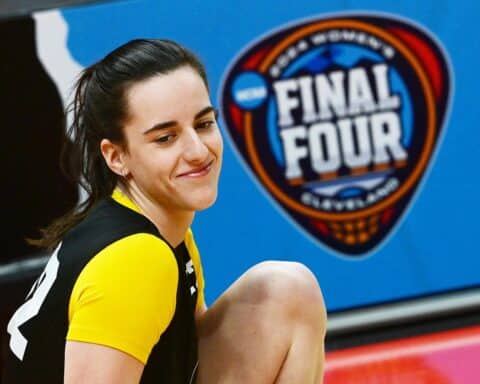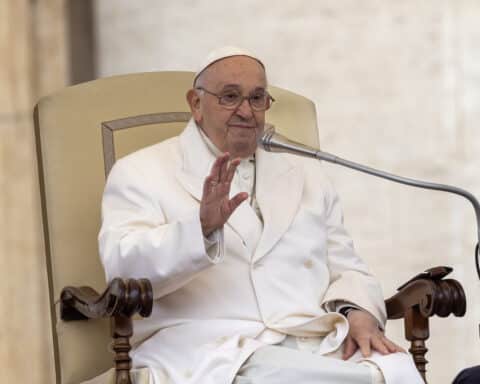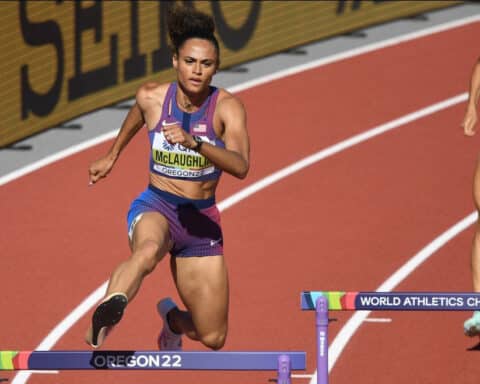Sports can bring out the best in people. And the worst. Hard work, character and commitment are traits developed through athletics, but pride and a cut-throat competitiveness also are possibilities.
Pope St. John Paul II, the “sportsman pope,” spoke frequently about sports as a potential training ground of virtue. In a 1990 address at a conference of Sports and Ethics in Rome, he explained, “Christian life is like a rather demanding sport combining all a person’s energies to direct them toward the perfection of character, toward a goal which realizes in our humanity the ‘measure of Christ’s gift’ (Eph 4:7).”
Recognizing the natural relationship between sports and virtue, a number of Catholic programs have formed around the idea that athletics can be more than just a training ground for sports competitions, but it can help put participants on a path to eternal life.
Greatness in Virtue
The University of Mary in Bismarck, North Dakota, just rolled out their Greatness in Virtue program at the start of the school year. It is an extension of the school’s mission of holiness for all students, recognizing unique opportunities through athletics. According to president Msgr. James Shea, “While the objective of the game is to win, the purpose of the game is to become what we are created to be.”
The 31-page strategic plan outlines how athletics can develop six virtues — magnanimity, humility, prudence, courage, justice and temperance — to pursue greatness. “They [student athletes] will realize that to aspire simply to a championship is not to set a goal too high, but far too low, and that authentic greatness pursues much more,” it states.
The plan covers everything from coaching and recruiting to developing leadership and personal development, academics, safety, health and well-being, and community integration. There will be a follow-up evaluation process and the plan is to eventually host institutes to share this plan with other schools.
Jerome Richter, vice-president for public affairs and mission advancement explained that the message to their 450 athletes from 17 teams is that their job is to win, but their purpose is to grow in virtue and be the person God created them to be. “An athlete’s heart automatically recognizes the value of discipline,” he said. “We are made for greatness for souls on the mat, on the field and in life.”
Richter pointed out that athletes also need to learn to lose, but the lesson is to never give up. “It relates to salvation, too,” he said. “You never quit. Like going to confession; pick yourself up and keep going.”
Father Craig Vasek, a multi-sport athlete in high school, ordained in 2010 in Crookston, Minnesota, and a graduate of the Pontifical North American College in Rome, was hired in January as the full-time chaplain for UMary’s athletic department. He has worked with the Missionaries of Charity in Europe, Asia, Africa and North America, and he hosts a blog and podcast and various shows on Real Presence Radio.
Competition is the perfect place to develop virtue, he said. “Athletes understand this,” Father Vasek said. “It’s through the repetition of doing things over and over that it becomes second nature, and it’s the same with virtues.”
There are team-building exercises, and often Father Vasek just talks to the players. “You are down six points and need a touchdown,” he proposed to the football team one day. “Who is the one you can lean on to rally the team and rise to the occasion?” Through this question, he said that recognizing virtues in ourselves and others seemed to come to life in the players.
Father Vasek shared that recently some of the girls from the volleyball team thanked him for teaching them how to pray beyond just asking for things. “UMary exists for the salvation of souls, and sports [are] a way to engage with students in a practical way,” he said.
Dale Lennon, the director of athletics who has coached for 31 years at several colleges and helped to create the strategic plan, said the Greatness Through Virtue program identifies what he had been working toward all along, but it identifies the goals clearly and brings all the pieces together.
“Our coaches understand the concepts and buy into it, too,” he said. “It’s not a cookie-cutter approach. Everyone has their own personalities and different teams are in different stages of development, but we are all in this together.”
Personal Development
Barry Dean, president and executive director of the Alabama Baseball Coaches Association, had his faith reawakened in 2010 after binge-listening to Lighthouse Catholic Media talks. The following year, he founded the Association of Catholic Coaches and Athletes to educate, honor, inspire and evangelize coaches and athletes. Annual membership is $50 and offers inspirational material and a subscription to the quarterly newsletter. Dean also arranges for Mass to be available for Catholics that attend the national baseball, football and basketball conventions.
“I love inspiring Catholic coaches,” Dean said. “When someone is on fire for their faith, it spreads into all areas of their life.”
The spiritual life is easy to relate to sports, he said. “Just as an athlete needs to eat healthily and work out more than one day a week, we can’t expect to practice our faith just once a week,” Dean said. Without that discipline and spiritual reinforcement, he said athletes are easily pulled into a bad direction of immoral behavior. “The goal is to get Catholic coaches — male and female — to integrate their faith into sports, and they will influence others, too.”
Another program, Varsity Catholic, was launched by Thomas Wurtz in 2007 as part of the Fellowship of Catholic University Students (FOCUS) to seek out athletes and draw them deeper into their faith. Wurtz has served as a FOCUS missionary since 2001. He had played a semester of football and then rugby in college and realized that while athletes are influencers, they also face many unique challenges and pressures.
Through prayer, going to their games and developing friendships, Varsity Catholic missionaries seek to help athletes realize that their deepest identity is in Christ and they can glorify him in their sport and in their daily lives.
Play Like a Champion
Notre Dame’s Play Like a Champion program addresses sports at the youth and high school levels. It was developed in 2006 as a result of research that identified many kids were learning poor character traits in sports. Through primarily coaches’ training, it elevates sports as fun and includes Catholic faith formation.
According to program director Kristen Sheehan, there are more than 150 programs and 2,000 schools currently using it, primarily at Catholic schools and Catholic Youth Organizations. One area of concern they currently are working on in Chicago is finding ways to help more children from poor neighborhoods participate in sports so they are more likely to stay out of gangs.
Coaches receive training and curriculum with ways to teach athletes how to treat teammates and officials respectfully and how to encourage leadership, fairness and spirituality. Participants receive daily athletic reflections in their inbox such as the “Sports Stations of the Cross,” which reflects on Jesus falling three times but still getting back up. There are also athletic reflections through the mysteries of the Rosary. Coaches are encouraged to pray before and after practices and games, go to Mass as a team, make a retreat and teach the children about St. Sebastian, the patron saint of athletes.
“This is a way for the Church to invest in children,” Sheehan said, “Most children want to experience the joy of Christ as they play, run and compete. We train coaches to see themselves as ministers and impart character formation and faith formation and to also celebrate the joy and playfulness of the game.”
Patti Maguire Armstrong writes from North Dakota.





